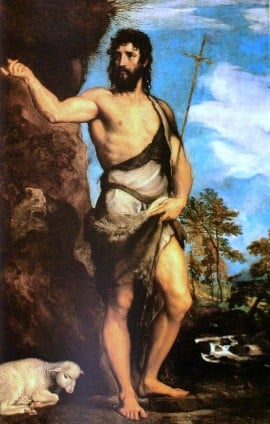The Advent Ice Bucket Challenge
Sobering News from the Wilderness
Confession. It’s a ghastly business in our culture. It’s like pouring a bucket of ice water over your own head. And it’s something the powerful and the criminal squander wealth and power to avoid doing.
Think of all those NCIS shows, in which a team of able detectives, armed with the latest technology and forensic investigation, use their experience, their talented noses for smelling rats, their valor and fitness for combat, all to bring criminals to confession.
Think of Bill Clinton, putting the whole country through agony while he tried to parse the meaning of ‘and’ in an impeachment hearing. Eight years as President, and his most remembered quote will always be, ‘I never had sex with that woman.’
Think of Donald Trump, who in one year as President has become known as the Liar in Chief, as he tweets a daily stream of falsehoods.
Think of Charlie Rose, who was sure he saw consent twinkling in the eyes of women on his payroll (who were half a century younger than he was) when he slipped into his bathrobe.
Think of Congressman Conyers, who has checked himself into the hospital to avoid confessing to office sexual harassment, for which he paid hush money. At 88, he is insisting on his innocence, wanting his laudatory accomplishments to somehow inoculate him against his sins. Think of the tax payer dollars that were used to provide that inoculation. But who can forgive what remains unconfessed?
Think of Roy Moore. O Lordy, Lordy.
And now hear the word of God: “See, I am sending my messenger ahead of you . . .”
And Mark tells us, then John the baptizer appeared, proclaiming a baptism of repentance for sin.
And that would be astounding enough, were it not for the next part of Mark’s account: that people from the whole countryside around Judea were going out into the wilderness to be baptized by John.
Astounding. John the Baptist is an astounding figure on the world stage of religious leaders. He’s not meek. He’s not winsome. He rants. He’s uncombed and unkempt and he eats locusts.
Yuck. Before this, the messengers of God have always been angels. Always, always. And they look like – well, you know. Hey, wait. We don’t know, not from the Bible anyway. We know the iconography of medieval paintings, angels wearing robes, mostly white, with wings, halos – and all of this is based on – God knows what.
So, could John the Baptist be an angel? Is this what angels look like? It’s what this messenger of God look like, so it must be. Angelic. Wow.
And who are these people who flock out to this messy wildguy, and willingly confess their sins? Clearly, they are not Americans.
For we are the people who are sure we’re not wrong. We make mistakes. We do not commit sins. We’re sure the charges are exaggerated, and our memories are, however we may have, regrettably, hurt you, you consented. We’re good people, really.
And yet the Word is, that the only road that leads to Christmas begins with confession.
With a heartfelt contrition that we are not the people we have pretended to be, that we have sinned and sinned and sinned some more. That, in the words of the old confession, there is no health in us.
Gosh, that is really un-American. We always have counselors available to deal with our grief and despair, so that we will not feel this way.
We maintain our self-esteem, with lawyers, denials, meticulous parsing of the situation, and, if need be, with a few remedial prayers.
It appears God won’t have it. If we are to get to Christmas, we have to get there through an angel. Absolutely everyone involved in Christmas gets there by way of angels.
Mary had an angel visitor. Joseph had an angel in his dreams. The Shepherds had an entire host of angels. The Magi, who messed up on star-following, had an angel who got them straightened out.
And we – well, we have John, the Voice Crying in the Wilderness. He alone knows the way to Bethlehem.
Bethlehem lies beyond the trail of tears. Our tears. And it arises in mystical time, in a moment that is forever available, and never easy to find.
The riven heart, the beseeching eye, the wail that comes from our own darkness, these are the only directions we are given, these are the GPS bearings that will get you to Bethlehem.
We will find our way to that rough hewn cradle when we can pour out the shame we have been hiding in ourselves. And that requires us to cease being the moral monitors of others’ hearts, and to look honestly into our own, where we have been hiding a collection of false idols:
The perfect soul-mate, for instance. How shall we find, lure, advertise, rendezvous, position ourselves for the bliss we imagine, for a life other than the ordinary life we have been given?
The perfect Voice of God. The true mentor will never offend us, never challenge our detailed comfort zone, never name the territory of our sins as sinful, never sound snarky to our ears, but always respect what we have done as a part of our searching, not our folly, and certainly not our idolatry. The perfect mentor will make us feel wonderful, always.
Surely, the Angel will make us feel beloved. Is that not what God is about?
Biblically speaking, no. That is not what God is about.
The angels who waited on Gideon, Jonah, Joseph, even Mary, did not make them feel beloved. They challenged all of them to go as far away from their comfort zone as possible. To take up tasks they did not want to do. To set aside their own plans and their pleasures, and to risk everything. And to accept their challenge, alone.
In the end, of course, none of them was alone. But they felt alone, when the angel set before them the choice to be faithful, or not to be.
Angels do not come to bring us comfort. They come to bring us God’s word and what God asks of us.
“I am not worthy,” said John, making his own confession before them all, this throng of strangers, anyone of whom could have turned him in to Herod the King. “I am not worthy to stoop down and untie the thong of his sandals.” And he hadn’t even met Jesus yet.
Any true angel would say as much about the presence of the Holy, whom the angel serves.
And so that is to be our road to Bethlehem. It winds through our own unworthiness, till it reaches a place where we may be born anew.
__________________________________________________________________________________________
Images: Portrait of John the Baptist by Titian, Vanderbilt Divinity School Library, Art in the Christian Tradition.
Russian Icon of John the Baptist. Vanderbilt Divinity School Library, Art in the Christian Tradition.










